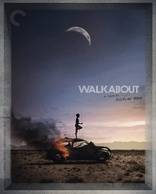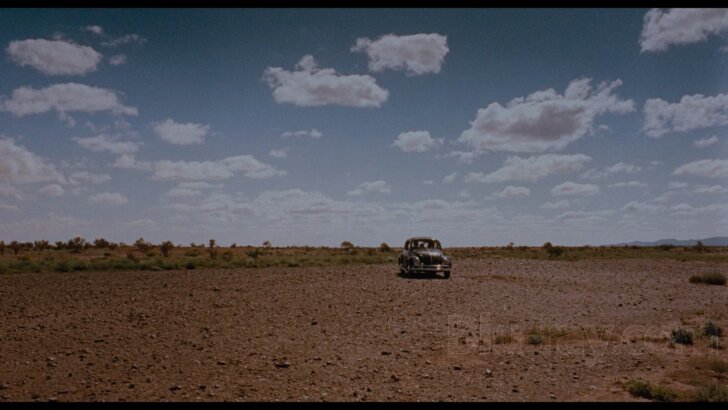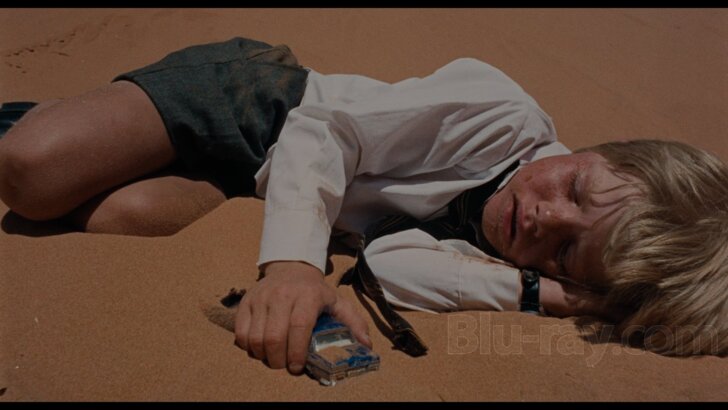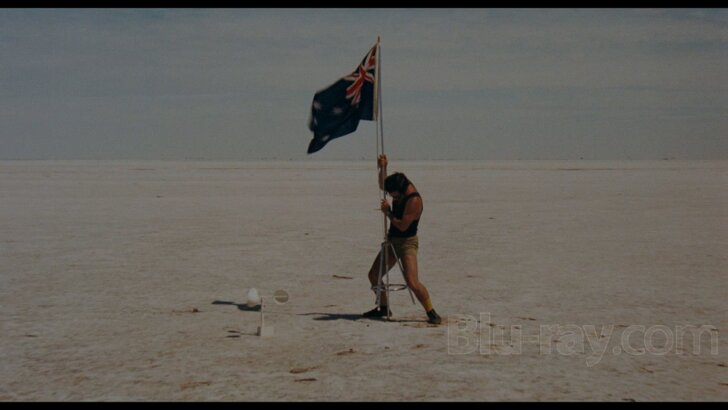Walkabout 4K Blu-ray Movie
HomeWalkabout 4K Blu-ray Movie 
4K Ultra HD + Blu-rayCriterion | 1971 | 101 min | Not rated | Sep 12, 2023

Movie rating
7.7 | / 10 |
Blu-ray rating
| Users | 5.0 | |
| Reviewer | 4.0 | |
| Overall | 4.0 |
Overview
Walkabout 4K (1971)
Following the suicide of their father, Mary and her younger brother Peter are left stranded in the blistering heat of the vast Australian outback. Facing exhaustion and starvation, their salvation comes when they cross paths with an Aboriginal boy on ‘walkabout’, a ritual in which he must leave his home and learn to survive off the land. He teaches them how to survive in the wilderness, but a clash of cultures leads to terrible and tragic consequences.
Starring: Jenny Agutter, Luc Roeg, David Gulpilil, John Meillon, Robert McDarraDirector: Nicolas Roeg
| Drama | Uncertain |
| Coming of age | Uncertain |
| Adventure | Uncertain |
Specifications
Video
Video codec: HEVC / H.265
Video resolution: 4K (2160p)
Aspect ratio: 1.85:1
Original aspect ratio: 1.85:1
Audio
English: LPCM Mono (48kHz, 24-bit)
Subtitles
English SDH
Discs
Blu-ray Disc
Two-disc set (2 BDs)
4K Ultra HD
Playback
Region A (locked)
Review
Rating summary
| Movie | 5.0 | |
| Video | 0.0 | |
| Audio | 5.0 | |
| Extras | 4.0 | |
| Overall | 4.0 |
Walkabout 4K Blu-ray Movie Review
Reviewed by Dr. Svet Atanasov August 23, 2023Nicolas Roeg's "Walkabout" (1971) arrives on 4K Blu-ray courtesy of Criterion. The supplemental features on the release include an audio commentary with Nicholas Roeg and Jenny Agutter; Darlene Johnson's documentary film "Gulpilil - One Red Blood"; an interview with actress Jenny Agutter conducted for Potemkine Films in France; an interview with Luc Roeg, son of director Nicholas Roeg; and a theatrical trailer. In English, with optional English SDH subtitles for the main feature. Region-Free.

A man (John Meillon, The Fourth Wish) decides to take his teenage daughter (Jenny Agutter, An American Werewolf in London) and son (Luc Roeg) deep into the Australian Outback for a picnic. Once there, he goes berserk and attempts to kill them. When they run away, he torches his car and then blows his brains out. Alone, the girl and the boy embark on a treacherous journey back to civilization.
Along the way, the two meet a young Aboriginal boy (David Gulpilil, Rabbit-Proof Fence) who is on a “walkabout”, a rite of passage into manhood. He does not speak their language and they don’t speak his. Nevertheless, the Aboriginal boy begins teaching his new friends how to survive.
The more time the three spent together, the more interested they become in each other. Eventually, mesmerized by the girl’s beauty, the Aboriginal boy decides to reveal his feelings to her. He performs a traditional mating dance, but the girl misinterprets it and rejects his advances, which forces him to commit suicide. Shocked and heartbroken, the girl and her brother continue their journey. Eventually, they reach civilization but quickly discover that everything has changed.
Based on James Vance Marshall's book, Nicholas Roeg's Walkabout is a fascinating exploration of two very different cultures. One seems primitive, the other advanced and modern. Both are aware of each other, but only the former is interested in reaching out.
The main characters in the film are innocent young people whose minds have not yet been corrupted by fear or hatred. They meet by chance and connect out of curiosity. They learn to communicate with each other but not by speaking a common language; rather by avoiding words and following their instincts. They also observe each other and gradually begin to learn about the things that make them different.
The message Walkabout delivers, however, is not that despite their cultural differences people could connect. Rather, it is a message that points to the fact that it is the environment people live in that determines what their limitations are, what their talents are, and what they would become. There is a good reason why the main characters in Walkabout are young people who have not yet completed their cultural training -- the girl is still in school while the Aboriginal boy is on his way to complete his final educational course, the walkabout -- and are later on seen struggling to survive after they are forced out of their comfort zones.
The dialog in Walkabout is rather limited, and communication is done primarily through images. Also, there are a variety of different flashbacks that pop up throughout the film that draw parallels between urban life and life in the Outback, as well as how men treat nature in general.
I imagine that Walkabout would not resonate with modern audiences in the same way it did with those who saw it during the early '70s. The film does look dated and its fragmented structure, which was once a hot topic of discussion, does not seem as controversial.
Still, it is impossible not to admire Roeg, who before 1970 worked as a cinematographer for such renowned directors as François Truffaut (Fahrenheit 451) and John Schlesinger (Far from the Madding Crowd), for his ability to capture life in such a poetic fashion. This is a simple yet so profoundly moving film, and if you think carefully about what it attempts to convey to its audience, so incredibly accurate.
*In 1971, Walkabout was nominated for the prestigious Palme d'Or award at the Cannes Film Festival. However, when the film was eventually released in Australia, many local critics were not overly impressed with it.
Walkabout 4K Blu-ray Movie, Video Quality 

Criterion's release of Walkabout is a 4K Blu-ray/Blu-ray combo pack. At the moment, I only have the 4K Blu-ray disc, which is Region-Free. I will update our review once I have a market copy with the Blu-ray disc.
The following text appears inside the booklet that is provided with this release:
"The new digital master on the 4K Blu-ray was created from the 35mm original camera negative, which was scanned in 4K resolution on a Lasergraphics Director film scanner. Color correction was based on a high-definition master (made from a 35mm preservation interpositive) with timing approved by director Nicolas Roeg. The monaural soundtrack was remastered from the 35mm optical sound print.
Colorists: Giles Sherwood, Lee Kline/Criterion Post, New York."
Please note that all screencaptures that appear with this article are taken from the 4K Blu-ray and downscaled to 1080p. Therefore, they do not accurately reflect the quality of the 4K content on the 4K Blu-ray disc, including the actual color values of this content.
I really like Walkabout and have five home video releases of it in my library. Three are Blu-ray releases. Two are old DVD releases. I think that the best one is Criterion's first Blu-ray release. While now the film looks slightly dated on it, I think that it still looks very, very good.
This upcoming release introduces a new 4K restoration of the film that can be viewed with HDR and Dolby Vision grades. I viewed the entire native 4K presentation of it with HDR.
First, the new 4K makeover produces healthier and sharper visuals. The density levels of these visuals are, unsurprisingly, better than those that the visuals on the original Blu-ray release produce. Clarity is improved as well. This is a very consequently improvement because the film has some tremendous panoramic visuals that clearly look better now. There are no traces of problematic digital corrections, so the surface of the visuals has a solid organic appearance. Colors are lush and stable. However, there are several areas where I immediately noticed discrepancies. To be clear, there isn't any preset tinting that instantly alters the color scheme of the visuals, but if you know the film, you will recognize that some areas look different. How different? It depends. Sometimes a primary color is different, sometimes there are supporting nuances that are different. However, there are is a lot of material where everything looks as it should only much, much better. The most obvious discrepancies involve primary blue. For example, screencaptures #7 and 8 demonstrate the shift quite well. I think that the shift is too strong and do not like it, but opinions are likely to vary. Elsewhere, there are much smaller adjustments but they affect the overall color temperature as well. I prefer the warmer color temperature of the previous release whose color timing was approved by Nic Roeg. Image stability is excellent. The entire film looks immaculate as well.
Walkabout 4K Blu-ray Movie, Audio Quality 

There is only one standard audio track on this release: English LPCM 1.0. Optional English SDH subtitles are provided for the main feature.
The audio is outstanding. I am unsure if it has been newly remastered but there are several areas of the film where I think that the audio is superior now. It definitely sounded clearer on my system. However, the previous release uses an audio track that was remastered from a 35mm optical soundtrack and is also very, very good.
Walkabout 4K Blu-ray Movie, Special Features and Extras 

4K BLU-RAY DISC
- Commentary - this audio commentary with director Nicholas Roeg and Jenny Agutter was recorded for Criterion in 1996, and it appeared on the label's DVD release of Walkabout. The commentary is excellent -- it is very personal, revealing details about the production process and how specific scenes were shot, as well as the complex thematic structure of the film and its message.
- Commentary - this audio commentary with director Nicholas Roeg and Jenny Agutter was recorded for Criterion in 1996, and it appeared on the label's DVD release of Walkabout. The commentary is excellent -- it is very personal, revealing details about the production process and how specific scenes were shot, as well as the complex thematic structure of the film and its message.
- Luc Roeg - Nicolas Roeg's son Luc played the young boy in Walkabout (credited as Lucien John). Luc Roeg is now a London-based film producer whose credits include Let Him Have It, Spider, and Nicolas Roeg's Two Deaths. In this video interview, recorded exclusively for Criterion in 2010 in London, he talks about the poetic beauty of Walkabout, the shooting process, his father's legacy, etc. In English, not subtitled. (21 min).
- Jenny Agutter - an interview with actress Jenny Agutter conducted in 2008 for Potemkine Films in France. In it, she recalls how director Nicholas Roeg approached her, her encounter with David Gulpilil, how certain parts of Walkabout were filmed, her initial impressions of it, etc. In English, not subtitled. (20 min).
- Gulpilil - One Red Blood - a truly fascinating documentary film by Darlene Johnson about the famous actor and his colorful life, as well as his homeland. The film was shot in 2002. In English, not subtitled. (57 min).
- Trailer - the original theatrical trailer for the film. (5 min).
- Booklet - a 28-page illustrated booklet containing Paul Ryan's essay "Landscapes of Memory" (the author is a writer and actor whose books include Never Apologise: The Collected Writings of Lindsay Anderson).
Walkabout 4K Blu-ray Movie, Overall Score and Recommendation 

The 4K makeover of Walkabout produces very healthy and frequently very beautiful visuals. However, some of them do not look as they did on Criterion's original Blu-ray release of the film. Even though it is fair to say that the film has a slightly dated appearance on it, or at least by contemporary standards, I prefer that appearance. I think that it is the correct appearance too because its color timing was approved by Nic Roeg. A lot of people will disagree, move on to the 4K makeover, and will almost certainly be very happy with it, which is perfectly fine. So, you have to decide whether the old Blu-ray release or the upcoming 4K Blu-ray is the best option for you. For me, the best option remains the old Blu-ray release. RECOMMENDED.
Similar titles
Similar titles you might also like

Wake in Fright
1971

Gerry
2002

The Man Who Fell to Earth
Limited Collector's Edition
1976

Black Narcissus
1947

Paris, Texas 4K
1984

Red Desert
Il deserto rosso
1964

Picnic at Hanging Rock 4K
Director's Cut
1975

Vivre sa vie
Vivre sa vie: Film en douze tableaux / My Life to Live
1962

Swiss Army Man
2016

Deliverance
1972

Mine
2016

Call Me by Your Name
2017

The Ice Storm
1997

Letter Never Sent
Неотправленное письмо / Neotpravlennoe pismo
1959

The King of Marvin Gardens
1972

20th Century Women
2016

Aquarius
2016

Jauja
2014

Fish Tank
2009

Bigger Than Life
1956
